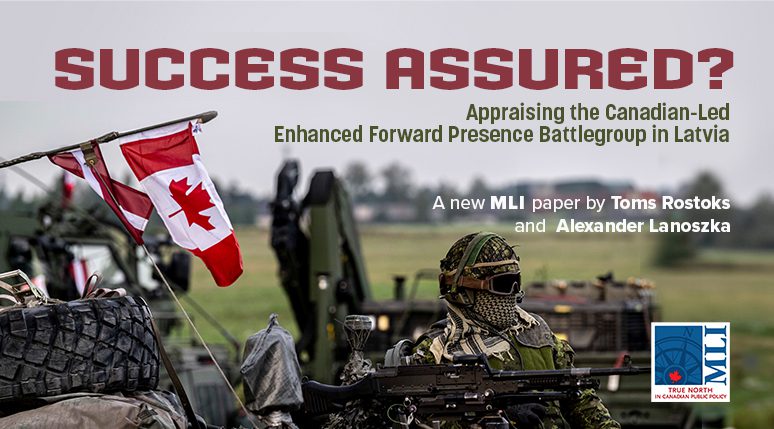By Toms Rostoks and Alexander Lanoszka
April 2, 2024
Executive Summary
At the 2016 NATO Warsaw Summit, members announced the formation of the enhanced Forward Presence (eFP), a set of multinational battalion-sized battlegroups deployed to the Baltic region for the purposes of reassuring the countries there most worried about Russian military aggression. Canada agreed to become the Framework Nation for Latvia and so has been leading the largest and most multinational battlegroup ever since.
The Canadian-Latvian partnership, now in its seventh year, has not only been trouble-free, but also a success story. Canadian troops are welcome, there have been no significant incidents involving Canadian forces, Latvia has significantly altered its military posture, and the multinational diversity that characterizes the battlegroup seems to be a source of strength rather than of weakness. Nevertheless, despite such success, challenges appear to be mounting.
One key decision made at the 2022 NATO Madrid Summit was to expand the battlegroup from a battalion to a brigade. For Canada, how it will provide the necessary troops and armaments is unclear given the cumulative effects of many years of chronic under-investment in the Canadian Armed Forces. The Latvian government may face its own difficulties in increasing defence spending up to 3 percent of gross domestic product by 2027. Its own economic development has fallen behind that of its Baltic neighbours and sustaining such high levels of military expenditures over the long run may be challenging.
The fundamental problem facing the battlegroup is that its capabilities might be insufficient to properly defend Latvia against a highly resolved and militarily reconstituted Russia. Canada is unlikely to be able to contribute beyond its current military commitment. Moreover, being situated on the other side of the Atlantic Ocean means that Canada cannot surge its military presence in Latvia rapidly. Indeed, Canada announced cuts to its defence budget at a time when the Canadian Armed Forces is already under severe strain. In the short-term at least, it is reassuring that Canada will indeed deploy 2200 troops to Latvia and will have equipment prepositioned for the whole brigade. In the medium-to-long term, however, doubts remain about the ability of Canada to carry out its pledges fully and effectively.
Latvia appreciates the difficulties that Canada is experiencing and has not been idle. It has reintroduced conscription to build a larger military. It has also increased its defence spending and is in the process of acquiring critically important military platforms such as medium-range air defence, artillery rocket, and coastal defence systems that in turn will help the Canadian-led bridge operate more effectively in Latvia. Crucially, Latvia announced plans to develop a large new military training base in Selonia, which would allow for larger military exercises that can even involve the other eFP battlegroups deployed in the Baltic region.
The eFP has received little public attention in Canada, whereas in Latvia there is broad social consensus on the need to address the security threat posed by Russia. However, considerable differences remain with regards to how average Latvians and the country’s Russian-speaking minority population view security challenges posed by Russia. One recent controversy in Latvia was whether to use anti-personnel landmines along the Latvian border with Russia and Belarus. The outcome of this bitter and divisive discussion was that Latvia would not pursue the acquisition of anti-personnel landmines, but it would develop a Baltic Defence Line together with Estonia and Lithuania and invest in fortifications and prepared defenses along its border with Russia and Belarus. Presumably, the fact that the “Ottawa Treaty” banning anti-personnel mines takes its public name from Canada’s capital might have dissuaded Latvian officials from considering using such weapons.
We conclude the report by making several policy recommendations:
- Ensure the continued interaction between Canadian and Latvian forces amid concerns that new basing options within Latvia would lead to less interaction between the multinational battlegroup and its Latvian counterpart.
- Deepen political and military cooperation between the three Baltic Host Nations and the three Framework Nations since the Baltic states together constitute one single operational theatre.
- Develop a credible plan in Canada for its force posture in view of the tightening constraints that the Canadian Armed Forces is facing in the current environment.
- Prepare members of the Canadian public for a long-term containment strategy against Russia because the low visibility of the eFP mission may mean a lack of understanding of the stakes involved as well as of commitments that the Canadian government has undertaken to European security.
Read the full paper here:







